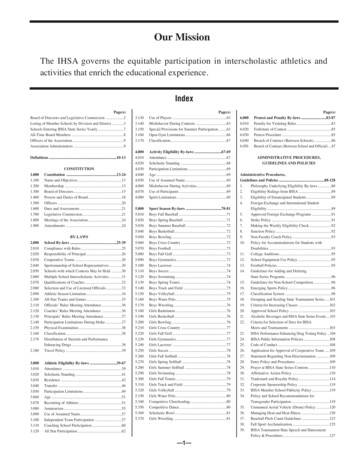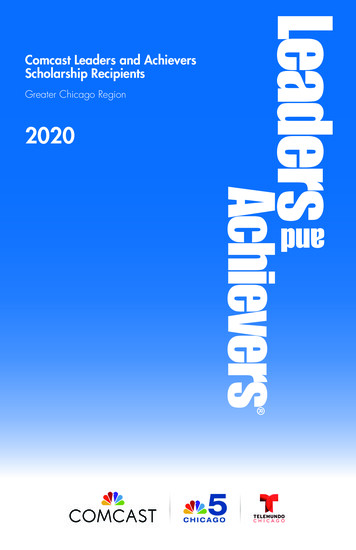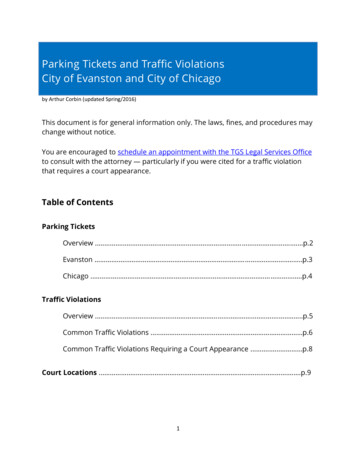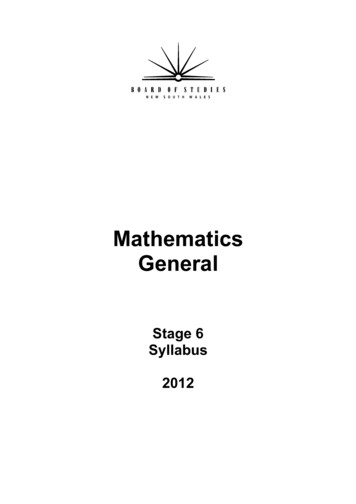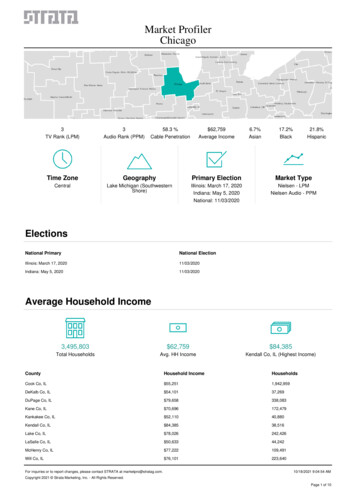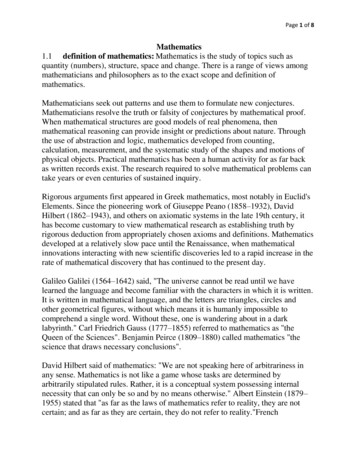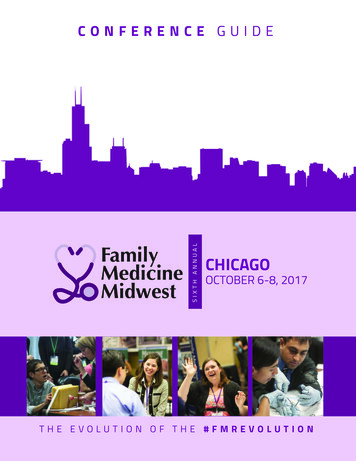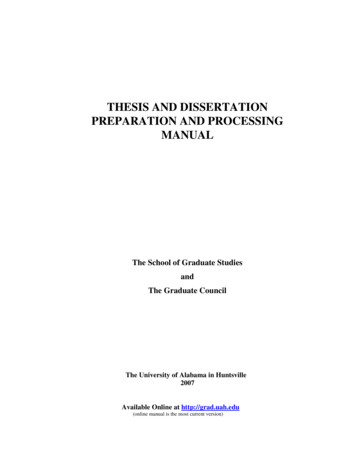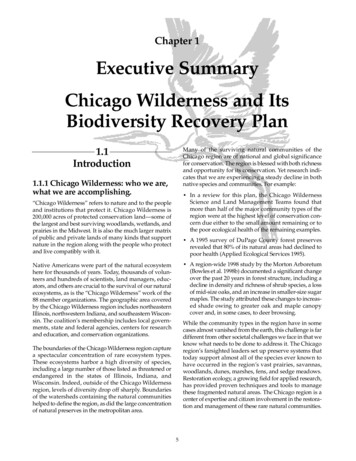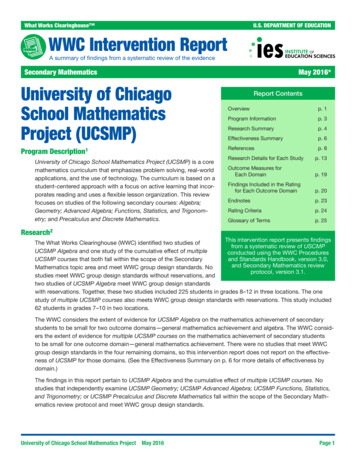
Transcription
What Works Clearinghouse U.S. DEPARTMENT OF EDUCATIONWWC Intervention ReportA summary of findings from a systematic review of the evidenceSecondary MathematicsMay 2016*University of ChicagoSchool MathematicsProject (UCSMP)Program Description1University of Chicago School Mathematics Project (UCSMP) is a coremathematics curriculum that emphasizes problem solving, real-worldapplications, and the use of technology. The curriculum is based on astudent-centered approach with a focus on active learning that incorporates reading and uses a flexible lesson organization. This reviewfocuses on studies of the following secondary courses: Algebra;Geometry; Advanced Algebra; Functions, Statistics, and Trigonometry; and Precalculus and Discrete Mathematics.Report ContentsOverviewp. 1Program Informationp. 3Research Summaryp. 4Effectiveness Summaryp. 6Referencesp. 8Research Details for Each Studyp. 13Outcome Measures forEach Domainp. 19Findings Included in the Ratingfor Each Outcome Domainp. 20Endnotesp. 23Rating Criteriap. 24Glossary of Termsp. 25Research2This intervention report presents findingsThe What Works Clearinghouse (WWC) identified two studies offrom a systematic review of USCMPUCSMP Algebra and one study of the cumulative effect of multipleconducted using the WWC Proceduresand Standards Handbook, version 3.0,UCSMP courses that both fall within the scope of the Secondaryand Secondary Mathematics reviewMathematics topic area and meet WWC group design standards. Noprotocol, version 3.1.studies meet WWC group design standards without reservations, andtwo studies of UCSMP Algebra meet WWC group design standardswith reservations. Together, these two studies included 225 students in grades 8–12 in three locations. The onestudy of multiple UCSMP courses also meets WWC group design standards with reservations. This study included62 students in grades 7–10 in two locations.The WWC considers the extent of evidence for UCSMP Algebra on the mathematics achievement of secondarystudents to be small for two outcome domains—general mathematics achievement and algebra. The WWC considers the extent of evidence for multiple UCSMP courses on the mathematics achievement of secondary studentsto be small for one outcome domain—general mathematics achievement. There were no studies that meet WWCgroup design standards in the four remaining domains, so this intervention report does not report on the effectiveness of UCSMP for those domains. (See the Effectiveness Summary on p. 6 for more details of effectiveness bydomain.)The findings in this report pertain to UCSMP Algebra and the cumulative effect of multiple UCSMP courses. Nostudies that independently examine UCSMP Geometry; UCSMP Advanced Algebra; UCSMP Functions, Statistics,and Trigonometry; or UCSMP Precalculus and Discrete Mathematics fall within the scope of the Secondary Mathematics review protocol and meet WWC group design standards.University of Chicago School Mathematics ProjectMay 2016Page 1
WWC Intervention ReportEffectivenessUCSMP Algebra was found to have potentially positive effects on general mathematics achievement and algebrafor secondary students.The cumulative effect of multiple UCSMP courses was found to have potentially positive effects on general mathematics achievement for secondary students.Table 1. Summary of findings3Improvement index(percentile points)Course and outcome domainRating ofeffectivenessAverageRangeNumber ofstudiesNumber ofstudentsExtent ofevidenceUCSMP AlgebraGeneral mathematicsachievementPotentially positiveeffects 29na1189SmallAlgebraPotentially positiveeffects 7–6 to 202225SmallPotentially positiveeffects 23na162SmallMultiple UCSMP coursesGeneral mathematicsachievementUCSMP GeometryNo evidenceUCSMP Advanced AlgebraNo evidenceUCSMP Functions, Statistics,and TrigonometryNo evidenceUCSMP Precalculus andDiscrete MathematicsNo evidencena not applicableUniversity of Chicago School Mathematics ProjectMay 2016Page 2
WWC Intervention ReportProgram InformationBackgroundUCSMP was developed by the University of Chicago and is published by the University of Chicago School Mathematics Project. Address: 1225 East 60th Street, Chicago, IL 60637. Email: ucsmp@uchicago.edu. Web: http://ucsmp.uchicago.edu. Telephone: (773) 702-1130. Fax: (773) 702-3114.Program detailsUCSMP was designed to support student development of deeper conceptual mathematical understanding. To thatend, the curriculum presents students with challenging mathematics and aids in student acquisition of skills andconcepts. The curriculum focuses on bringing the real world into the classroom by emphasizing reading, problemsolving, everyday applications, and the use of calculators, computers, and other technologies. Repetition andreview are used sparingly.Each UCSMP course includes a student textbook, teacher’s edition, teacher resources, assessment resources, andtechnology resources. Lessons in the student book contain activities, full examples, and partially completed guidedexamples to model skills and problem solving. Students are encouraged to assess their own understanding withan End-of-Chapter Self-Test correlated to objectives. Projects provided at the end of each chapter are designed asextended activities, giving students experience using real data. The use of technology—including graphing calculators at all grade levels, geometry systems, spreadsheets, the Internet, and other computer applications—is anessential component of the curriculum.The publisher is currently selling the third edition of UCSMP. The publisher’s website describes how the curriculumhas been refined and enhanced from the first and second editions.CostThe cost of UCSMP varies by course, each of which can be purchased individually. As of December 2015, theprices for the student edition of each course ranged from 69.00 to 72.00, the teacher’s edition cost 119.00,the teacher’s resources cost 89.00, the assessment resources cost 89.00, the electronic teacher’s edition cost 119.00, the Teacher’s Assessment Assistant cost 89.00, and the ExamView Assessment Suite cost 89.00.These prices are based on quantities of up to 150 for each course; prices could vary for quantities greater than 150.More cost information is available from the publisher’s website.University of Chicago School Mathematics ProjectMay 2016Page 3
WWC Intervention ReportResearch SummaryThis research summary includes information from studies of all available UCSMP courses for secondary students.The WWC identified 12 studies that were eligible for review: Three eligible studies investigated the effects of UCSMP Algebraon the mathematics achievement of secondary students.Table 2. Scope of reviewed researchGrade7–12Delivery methodWhole classProgram typeCurriculum Four eligible studies investigated the cumulative effect of 4 years of multiple UCSMP courses (includingUCSMP Transition Mathematics, UCSMP Algebra, UCSMP Geometry, and UCSMP Advanced Algebra) on themathematics achievement of secondary students. Five eligible studies investigated the effects of UCSMP Geometry; UCSMP Advanced Algebra; UCSMP Functions,Statistics, and Trigonometry; and UCSMP Precalculus and Discrete Mathematics on the mathematics achievement of secondary students.4The WWC reviewed the 12 eligible studies against group design standards. None of the 12 studies are randomizedcontrolled trials that meet WWC group design standards without reservations. Three of the 12 studies are randomized controlled trials or quasi-experimental designs that meet WWC group design standards with reservations.Those three studies focus on UCSMP Algebra and multiple UCSMP courses and are summarized in this report. Theremaining nine studies do not meet WWC group design standards.An additional 44 studies were identified but do not meet WWC eligibility criteria for review in this topic area. Citations for all 56 studies are in the References section, which begins on p. 8.Summary of studies of UCSMP Algebra meeting WWC group design standards without reservationsNo studies of UCSMP Algebra met WWC group design standards without reservations.Summary of studies of UCSMP Algebra meeting WWC group design standards with reservationsPeters (1992) conducted a randomized controlled trial in which the integrity of random assignment was compromised because some students did not remain in the study group to which they were randomly assigned—studentswere reallocated between the intervention and comparison groups to accommodate scheduling difficulties andstudent requests for other course offerings. The study demonstrated baseline equivalence on the analysis sampleand therefore, meets WWC group design standards with reservations. The study investigated the effect of UCSMPAlgebra on the mathematics achievement of 36 “math talented” eighth-grade students (17 UCSMP Algebra and19 comparison) from one junior high school in Nebraska during the 1991–92 school year. The district borders twolarge cities, and its students lived in rural and suburban areas. Students in the intervention group used the UCSMPAlgebra I first-edition textbook, while students in the comparison group used Saxon Algebra I.Thompson et al. (2006) used students’ mathematics ability to match six pairs of classrooms within three schoolsto evaluate the effectiveness of the second edition of UCSMP Algebra. Within each pair, random assignment ofclassrooms to the intervention or comparison condition was not always possible; therefore, this study is treatedas a quasi-experimental design. The WWC review focuses on the three high schools (X, Y, and Z in the study) thatcompared the use of the UCSMP (second edition) to that of non-UCSMP textbooks.5 These three high schools,located in three different regions of the country and serving three different populations of students, contributed 189ninth- through twelfth-grade students to the analysis (85% of the students were in ninth grade).University of Chicago School Mathematics ProjectMay 2016Page 4
WWC Intervention ReportSummary of studies of multiple UCSMP courses meeting WWC group design standards without reservationsNo studies of multiple UCSMP courses met WWC group design standards without reservations.Summary of study of multiple UCSMP courses meeting WWC group design standards with reservationsHirschhorn (1993) conducted a longitudinal, 4-year quasi-experimental evaluation of UCSMP (first edition) inthree high schools in which both traditional and UCSMP curricula were used. Every student in the interventiongroup received 4 years of UCSMP curricula, starting with Transition Mathematics in seventh grade and endingwith UCSMP Advanced Algebra in tenth grade. No student in the comparison group participated in any UCSMPcourses. Intervention students were matched to potential comparison students retrospectively using pretest (sixthgrade) scores, and outcomes were measured at the end of the 4-year period (tenth grade). Two high schools (Band C in the study) contributed 62 students to the analysis. A third high school (A in the study) is excluded from theWWC review because baseline equivalence between the intervention and comparison groups could not be established.University of Chicago School Mathematics ProjectMay 2016Page 5
WWC Intervention ReportEffectiveness SummaryThe WWC review of UCSMP Algebra and multiple UCSMP courses for the Secondary Mathematics topic areaincludes student outcomes in six domains: general mathematics achievement; algebra; geometry; statistics andprobability; trigonometry/precalculus; and calculus. The two studies of UCSMP Algebra that meet WWC groupdesign standards reported findings in two of the six domains: general mathematics achievement and algebra. Theone study of multiple UCSMP courses that meets WWC group design standards reported findings in one of thesix domains: general mathematics achievement. The findings below present the authors’ estimates and WWCcalculated estimates of the size and statistical significance of the effects of UCSMP Algebra and multiple UCSMPcourses on secondary students. For a more detailed description of the rating of effectiveness and extent of evidence criteria, see the WWC Rating Criteria on p. 24.Summary of UCSMP Algebra effectiveness for the general mathematics achievement domainTable 3. Rating of effectiveness and extent of evidence of UCSMP Algebra for the general mathematicsachievement domainRating of effectivenessCriteria metPotentially positive effectsEvidence of positive effects with nooverriding contrary evidence.In the one study that reported findings, the estimated impact of the intervention on outcomes in the generalmathematics achievement domain was a statistically significant positive effect. No studies showed a statisticallysignificant or substantively important negative effect.Extent of evidenceCriteria metSmallOne study that included 189 students in three schools reported evidence of effectiveness in the generalmathematics achievement domain.One study of UCSMP Algebra that meets WWC group design standards with reservations reported findings in thegeneral mathematics achievement domain.Thompson et al. (2006) found, and the WWC confirmed (after applying a correction for classroom-level clustering),one positive and statistically significant difference between the UCSMP Algebra and comparison groups in thegeneral mathematics achievement domain. The WWC characterizes this study finding as a statistically significantpositive effect.Thus, for the general mathematics achievement domain, one study of UCSMP Algebra showed a statistically significant positive effect. This results in a rating of potentially positive effects, with a small extent of evidence.Summary of UCSMP Algebra effectiveness for the algebra domainTable 4. Rating of effectiveness and extent of evidence of UCSMP Algebra for the algebra domainRating of effectivenessCriteria metPotentially positive effectsEvidence of positive effects with nooverriding contrary evidence.In the two studies that reported findings, the estimated impact of the intervention on outcomes in the algebradomain was: one study showing a statistically significant positive effect and one study showing an indeterminateeffect.Extent of evidenceCriteria metSmallTwo studies that included 225 students in four schools reported evidence of effectiveness in the algebra domain.University of Chicago School Mathematics ProjectMay 2016Page 6
WWC Intervention ReportTwo studies of UCSMP Algebra that meet WWC group design standards with reservations reported findings in thealgebra domain.Peters (1992) found, and the WWC confirmed (using a difference-in-differences approach), no statistically significant differences between the UCSMP Algebra and comparison groups in the algebra domain. The WWC characterizes these study findings as an indeterminate effect.Thompson et al. (2006) found a positive and statistically significant difference between the UCSMP Algebra andcomparison groups on the odd and even forms of the UCSMP Problem-Solving and Understanding Test, analyzedseparately. The WWC confirmed this finding, pooling the results from both versions of the form into one statisticallysignificant positive effect (after applying a correction for clustering). As a result, Thompson et al. (2006) reported,and the WWC confirmed (after correction for clustering), a positive and statistically significant difference betweenthe UCSMP Algebra and comparison groups in the algebra domain. The WWC characterizes these study findingsas a statistically significant positive effect.Thus, for the algebra domain, one study of UCSMP Algebra showed a statistically significant positive effect andone study showed an indeterminate effect. This results in a rating of potentially positive effects, with a small extentof evidence.Summary of multiple UCSMP courses effectiveness for the general mathematics achievement domainTable 5. Rating of effectiveness and extent of evidence of multiple UCSMP courses for the generalmathematics achievement domainRating of effectivenessCriteria metPotentially positive effectsEvidence of positive effects with nooverriding contrary evidence.In the one study that reported findings, the estimated impact of the intervention on outcomes in the generalmathematics achievement domain was a statistically significant positive effect. No studies showed a statisticallysignificant or substantively important negative effect.Extent of evidenceCriteria metSmallOne study that included 62 students in one school reported evidence of effectiveness in the general mathematicsachievement domain.One study of multiple UCSMP courses that meets WWC group design standards with reservations reported findings in the general mathematics achievement domain.Hirschhorn (1993) found no statistically significant effects in one site, and a positive and statistically significanteffect in another, on the Mathematics Level 1 Achievement test. The WWC pooled the results from both sites andfound no statistically significant differences between multiple UCSMP courses and comparison groups on the test.In addition, Hirschhorn (1993) found statistically significant positive effects in each site on the UCSMP-developedApplications Test, and the WWC confirmed this finding, pooling the results from both sites. Taking the two outcomes together, after adjusting for multiple comparisons, the WWC characterizes this study finding as a statisticallysignificant positive effect.Thus, for the general mathematics achievement domain, one study of multiple UCSMP courses showed a statistically significant positive effect. This results in a rating of potentially positive effects, with a small extent of evidence.University of Chicago School Mathematics ProjectMay 2016Page 7
WWC Intervention ReportReferencesStudies of UCSMP Algebra that meet WWC group design standards without reservationsNone.Studies of UCSMP Algebra that meet WWC group design standards with reservationsPeters, K. G. (1992). Skill performance comparability of two algebra programs on an eighth-grade population (Doctoral dissertation). Available from ProQuest Dissertations and Theses database. (UMI No. 9314428)Thompson, D. R., Senk, S. L., Witonsky, D., Usiskin, Z., & Kaeley, G. (2006). An evaluation of the second edition ofUCSMP Algebra. Chicago, IL: University of Chicago School Mathematics Project.Study of UCSMP Algebra that does not meet WWC group design standardsMathison, S., & University of Chicago School Mathematics Project. (1989). Teaching and learning algebra: An evaluation of UCSMP Algebra. Chicago, IL: University of Chicago School Mathematics Project. This study does notmeet WWC group design standards because equivalence of the analytic intervention and comparison groupsis necessary and not demonstrated.Studies of multiple UCSMP courses that meet WWC group design standards without reservationsNone.Study of multiple UCSMP courses that meets WWC group design standards with reservationsHirschhorn, D. B. (1993). A longitudinal study of students completing four years of UCSMP mathematics. Journalfor Research in Mathematics Education, 24(2), 136–158.Additional source:Hirschhorn, D. B. (1991). Implementation of the first four years of the University of Chicago School MathematicsProject secondary curriculum (Unpublished doctoral dissertation). University of Chicago, IL.Studies of multiple UCSMP courses that do not meet WWC group design standardsDavis, J. D., & Shih, J. C. (2007). Secondary options and post-secondary expectations: Standards-based mathematics programs and student achievement on college mathematics placement exams. School Science andMathematics, 107(8), 336–346. This study does not meet WWC group design standards because equivalenceof the analytic intervention and comparison groups is necessary and not demonstrated.McConnell, J. (1990). UCSMP sophomores on the PSAT. Glenview, IL: Glenbrook South High School. This studydoes not meet WWC group design standards because equivalence of the analytic intervention and comparison groups is necessary and not demonstrated.Tubbergen, L. (2001). High school reform math programs: An evaluation for leaders (Unpublished doctoral dissertation). Eastern Michigan University, Ypsilanti. This study does not meet WWC group design standards becauseequivalence of the analytic intervention and comparison groups is necessary and not demonstrated.Studies of UCSMP Advanced Algebra that do not meet WWC group design standardsSenk, S. L., & Thompson, D. R. (2006). Strategies used by second-year algebra students to solve problems. Journalfor Research in Mathematics Education, 37(2), 116–128. This study does not meet WWC group design standardsbecause equivalence of the analytic intervention and comparison groups is necessary and not demonstrated.Additional source:Thompson, D. R., & Senk, S. L. (2001). The effects of curriculum on achievement in second-year algebra: Theexample of the University of Chicago School Mathematics Project. Journal for Research in MathematicsEducation, 32, 58–85.University of Chicago School Mathematics ProjectMay 2016Page 8
WWC Intervention ReportThompson, D. R., Senk, S. L., Witonsky, D., Usiskin, Z., & Kaeley, G. (2001). An evaluation of the second edition ofUCSMP Advanced Algebra. Chicago, IL: University of Chicago School Mathematics Project. This study doesnot meet WWC group design standards because equivalence of the analytic intervention and comparisongroups is necessary and not demonstrated.Study of UCSMP Geometry that does not meet WWC group design standardsThompson, D. R., Witonsky, D., Senk, S. L., Usiskin, Z., & Kaeley, G. (2003). An evaluation of the second edition ofUCSMP Geometry. Chicago, IL: University of Chicago School Mathematics Project. This study does not meetWWC group design standards because equivalence of the analytic intervention and comparison groups isnecessary and not demonstrated.Study of UCSMP Functions, Statistics, and Trigonometry that does not meet WWC group design standardsSenk, S. L. (1989). Assessing students’ knowledge of functions. In C. A. Mahrer, G. A. Goldin, & R. B. Davis (Eds.),Proceedings of the eleventh annual meeting of the North American chapter of the International Group for thePsychology of Mathematics Education (vol. 2). New Brunswick, NJ: Rutgers University. This study does notmeet WWC group design standards because equivalence of the analytic intervention and comparison groupsis necessary and not demonstrated.Study of UCSMP Precalculus and Discrete Mathematics that does not meet WWC group design standardsThompson, D. R. (1994). An evaluation of a new course in precalculus and discrete mathematics (Unpublished doctoral dissertation). University of Chicago, IL. This study does not meet WWC group design standards becauseequivalence of the analytic intervention and comparison groups is necessary and not demonstrated.Studies of UCSMP that are ineligible for review using the Secondary Mathematics Evidence Review ProtocolAydin, N., & Halat, E. (2009). The impacts of undergraduate mathematics courses on college students’ geometric reasoning stages. The Montana Mathematics Enthusiast, 6(1), 151–164. This study is ineligible for reviewbecause it does not use a sample aligned with the protocol.Balfanz, R., Mac Iver, D. J., & Byrnes, V. (2006). The implementation and impact of evidence-based mathematicsreforms in high-poverty middle schools: A multi-site, multi-year study. Journal for Research in MathematicsEducation, 37(1), 33–64. The study is ineligible for review because it does not use an eligible design.Bryant, D. P., Bryant, B. R., Gersten, R., Scammacca, N., & Chavez, M. M. (2008). Mathematics intervention forfirst- and second-grade students with mathematics difficulties: The effects of tier 2 intervention delivered asbooster lessons. Remedial and Special Education, 29(1), 20–32. This study is ineligible for review because itdoes not use a sample aligned with the protocol.Additional source:Bryant, D. P., Bryan, B. R., Gersten, R. M., Scammacca, N. N., Funk, C., Winter, A., Pool, C. (2008). The effectsof tier 2 intervention on the mathematics performance of first-grade students who are at risk for mathematics difficulties. Learning Disability Quarterly, 31(2), 47–63.Davis, J. D., Smith, D. O., Roy, A. R., & Bilgic, Y. K. (2014). Reasoning-and-proving in algebra: The case of tworeform-oriented U.S. textbooks. International Journal of Educational Research, 64, 92–106. The study is ineligible for review because it is out of scope of the protocol.Fan, L., & Zhu, Y. (2007). Representation of problem-solving procedures: A comparative look at China, Singapore,and US mathematics textbooks. Educational Studies in Mathematics, 66(1), 65–75. The study is ineligible forreview because it is out of scope of the protocol.Findell, C. (1996). Mathematics education then and now: The need for reform. Journal of Education, 178(2), 3. Thestudy is ineligible for review because it is out of scope of the protocol.University of Chicago School Mathematics ProjectMay 2016Page 9
WWC Intervention ReportFraivillig, J. (1996). Case studies and instructional frameworks of expert reform mathematics teaching (Doctoraldissertation). Available from ProQuest Dissertations and Theses database. (UMI No. 9632689) The study isineligible for review because it does not use an eligible design.Halat, E. (2007). Reform-based curriculum & acquisition of the levels. Eurasia Journal of Mathematics, Science andTechnology Education, 3(1), 41–49. This study is ineligible for review because it does not use a sample alignedwith the protocol.Harwell, M. R., Post, T. R., Medhanie, A., Dupuis, D. N., & LeBeau, B. (2013). A multi-institutional study of highschool mathematics curricula and college mathematics achievement and course taking. Journal for Researchin Mathematics Education, 44(5), 742–774. The study is ineligible for review because it is out of scope of theprotocol.Additional sources:Danielle, M. N., Amanuel, T. R., & Dupuis, B. H. (2013). The impact of institutional factors on the relationshipbetween high school mathematics curricula and college mathematics course-taking and achievement.Educational Research Quarterly, 36(3), 22–46.Dupuis, D. N., Medhanie, A., Harwell, M., Lebeau, B., Monson, D., & Post, T. R. (2012). A multi-institutionalstudy of the relationship between high school mathematics achievement and performance in introductory college statistics. Statistics Education Research Journal, 11(1), 4–20.Hauser, L. A. (2015). Precalculus students’ achievement when learning functions: Influences of opportunity to learnand technology from a University of Chicago School Mathematics Project study (Doctoral dissertation). Available from ProQuest Dissertations and Theses database. (UMI No. 1677177885) The study is ineligible forreview because it does not use an eligible design.Heck, D. J., Chval, K. B., & Weiss, I. R. (2012). Approaches to studying the enacted mathematics curriculum. Charlotte, NC: IAP. The study is ineligible for review because it is out of scope of the protocol.Hedges, L. V., Stodolsky, S., Flores, P. V., Mathison, D., Mathison, S., Sarther, C. S., & Zhang, J. (1988). Formativeevaluation of UCSMP Advanced Algebra. In Advanced Algebra teacher’s edition (pp. T46–T48). Chicago, IL:University of Chicago School Mathematics Project. The study is ineligible for review because it is out of scopeof the protocol.Hedges, L. V., Stodolsky, S. S., Mathison, S., & Flores, P. V. (1986). Transition mathematics field study. Chicago, IL:University of Chicago School Mathematics Project. The study is ineligible for review because it is out of scopeof the protocol.Henderson, B. K. (1996). An evaluation of the use of UCSMP materials in a mathematics program (University ofChicago School Math Project) (Doctoral dissertation). Available from ProQuest Dissertations and Theses database. (UMI No. 9714356) The study is ineligible for review because it is out of scope of the protocol.Herbel-Eisenmann, B. A., Lubienski, S. T., & Id-Deen, L. (2006). Reconsidering the study of mathematics instructional practices: The importance of curricular context in understanding local and global teacher change.Journal of Mathematics Teacher Education, 9(4), 313–345. The study is ineligible for review because it doesnot use an eligible design.Hirschhorn, D. B. (1996). The influence of a reform curriculum on mathematics course enrollment patterns.Research note. Journal of Curriculum and Supervision, 11(3), 281–288. The study is ineligible for reviewbecause it is out of scope of the protocol.Hirschhorn, D. B., & Senk, S. (1992). Calculators in the UCSMP curriculum for grades 7 and 8. In J. T. Fey & C.R. Hirsch (Eds.), Calculators in mathematics education: 1992 yearbook (pp. 217–225). Reston, VA: NationalCouncil of Teachers of Mathematics. The study is ineligible for review because it does not use an eligibledesign.Lee, K. (2005). Student conceptual understanding and application on algebra-problem-based curricula. Journal ofthe Korea Society of Mathematical Education Series D: Research in Mathematical Education, 9(2), 125–133.The study is ineligible for review because it is out of scope of the protocol.University of Chicago School Mathematics ProjectMay 2016Page 10
WWC Intervention ReportLubienski, S. T. (2004). Traditional or standards-based mathematics? The choices of students and parents in onedistrict. Journal of Curriculum and Supervision, 19(4), 338–365. The study is ineligible for review because it isout of scope of the protocol.Mac Iver, M. A., & Mac Iver, D. J. (2009). Urban middle-grade student mathematics achievement growth under comprehensive school reform. Journal of Educational Research, 102(3), 223–236. The study is ineligible for reviewbecause it is out of scope of the protocol.Maggio, M. R., & Sayler, M. (2013). Trying out acceleration for mathematically talented fifth graders. Gifted ChildToday, 36(1), 21–26. The study is ineligible for review because it does not
grade) scores, and outcomes were measured at the end of the 4-year period (tenth grade). Two high schools (B and C in the study) contributed 62 students to the analysis. A third high school (A in the study) is excluded from the WWC review because baseline equivalence between the intervention and comparison groups could not be estab-lished.
